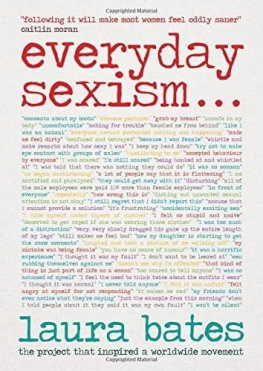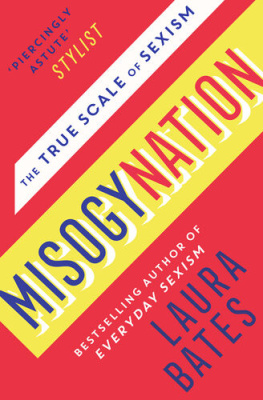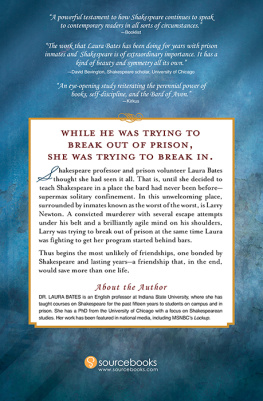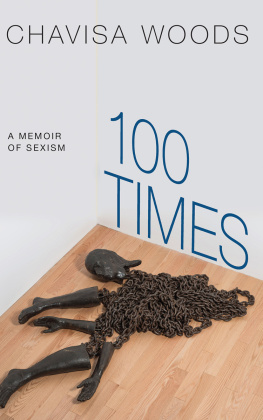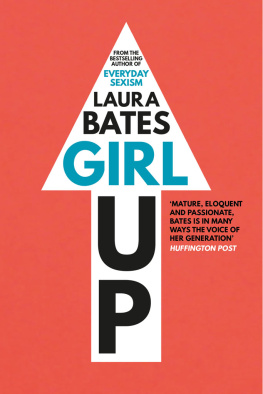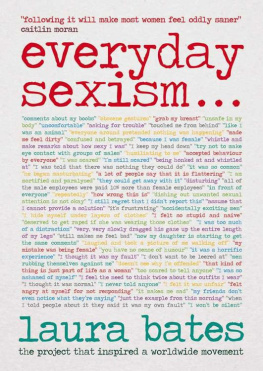
First published in Great Britain by Simon & Schuster UK Ltd, 2014
A CBS company
Copyright 2014 by Laura Bates
This book is copyright under the Berne Convention.
No reproduction without permission.
All rights reserved.
The right of Laura Bates to be identified as the author of this work has been asserted by her in accordance with sections 77 and 78 of the Copyright, Designs and Patents Act, 1988.
Simon & Schuster UK Ltd
1st Floor
222 Grays Inn Road
London WC1X 8HB
www.simonandschuster.co.uk
Simon & Schuster Australia, Sydney
Simon & Schuster India, New Delhi
A CIP catalogue record for this book is available from the British Library
ISBN: 978-1-47113-157-8
ISBN: 978-1-47113-158-5 (ebook)
The author and publishers have made all reasonable efforts to contact copyright-holders for permission, and apologise for any omissions or errors in the form of credits given. Corrections may be made to future printings.
This publication contains references to the Everyday Sexism Project website, www.everydaysexism.com, and the Projects Twitter account. The publishers do not accept any responsibility for the contents of websites and Twitter feeds which they do not own.
Typeset in the UK by Nick Venables
Printed and bound in Italy by L.E.G.O SpA
Contents
Foreword by Sarah Brown
One of the mysteries of becoming a parent is how you can simultaneously grow up and regress at the same time. Having children drags formative ideas, long submerged, violently to the surface and forces women to consider how they moved from the girl they were to the woman they are. For me the transition to motherhood was the catalyst for an almighty showdown with my own assumptions, memories, hopes and disappointments: all parts of me profoundly shaped by my early and lifelong experiences of everyday sexism.
If you want to understand what Im talking about, go and ask your nearest small friend what they want to be when they grow up. It doesnt need to be your son or daughter; it can be a cousin, nephew or niece, a friends child or neighbours little one. Chances are, if you ask them what they see in their future, youll get an answer of boundless confidence. On our small island we have enough aspirant Marie Curies to cure cancer 1,000 times over, enough Andy Murrays-in-waiting to win every Wimbledon until the end of time. And sufficient ambitious aspiring heads of LEGO male and female to make the current CEO a little nervous about his long-term future. Witnessing that limitless self-belief in my own boys for the first time threw me back to what I used to believe as a girl: that theres nothing really beyond somebody with the courage to try and the patience to practise.
Children, in other words, are not optimists in spite of the odds; they dont really understand that there are such things as odds. The idea that some things whether thats an Oscar, Olympic gold or an Oxford degree might not be for the likes of us simply does not compute.
Then something terrible happens. Some children learn the word no. Not the no of a loving parent introducing boundaries and keeping their kids from eating too many sweets or not sleeping enough or running out near roads or walking too close to a fire. But the harsh, horrible no of know your place. The no that, for some of us, gets more and more deafening with age, but which seems, like a dog whistle, to be completely inaudible to others who dont simply fail to respond; they dont even know its there.
Its the no that says skipping ropes are for girls and science kits are for boys. Its the no that says that nice girls dont and that plain ones better watch out in case they get left on the shelf. The no that says it doesnt matter whether youve a Cambridge professorship, an OBE or your own BBC series: youre still just an object to be appraised by cyber judges more interested in your body than your brain.
The most dangerous effect of that no is that it gets so deeply internalized you start saying it silently to yourself. You get so used to extra hurdles being put in your way that it becomes too exhausting to even think about clearing them and then you forget you even can clear them.
Well, Ive had enough of that no. And so has Laura Bates.
Lauras Everyday Sexism Project gives women the power over our own no. The power to say no to street harassment, to being discriminated against at work, to being patronized by companies more interested in pinkwash than serving real womens needs.
Through her online activism Laura has already inspired 50,000 of us in to #ShoutingBack and to asking men to shout along in tune just by tweeting out on @EverydaySexism.
When I spoke at a bloggers conference a few years ago I shared a little of my own experience of being trolled and said theres nothing more cowardly than a bully with a BlackBerry. That triggered a massive response of tweets and posts of sympathetic outrage, but I realize that this is as nothing compared to what is happening now. Todays online campaigners are getting something far, far worse rape threats from people whose shame should go with them to the grave. The only consolation I took from that horrible summer of 2013 was just how many men were disgusted to discover that this is something that happens and whose own feminism was awakened by their sudden glimpse of what women go through every day.
This, for me, is one of the most exciting aspects of what Laura has done with Everyday Sexism and is doing with this book. Neither are verdicts on men, but resources for men things that will help them understand the structure of patriarchy, which they can either replicate or resist in their own lives. The genius is that the project also serves as a brilliant, sparky, welcoming haven for girls and women who have suffered daily acts of vile sexism, grown too used to it for their own comfort and relish the chance to share, speak up and talk back.
That spirit of empathy of helping each of us to understand what happens to all of us is what gives Everyday Sexism its dynamism and what I hope will inspire all of you holding this book now to take action on behalf of some girls whose names you will never know and faces you will never see.
When Laura and I first started discussing her project, she explained that part of her hope was that giving women a place to log their experiences would render them visible and, therefore, important. My own work on getting kids who miss out on the chance to learn into school has a similar aim to make the global education emergency as visible and as important as previous catastrophes like slavery and apartheid. I have always believed that speaking up, and gathering together like-minded voices to amplify the message works that this reaches decision-makers and government leaders and holds them to account. I believe this because I have seen it work. We have all understood that it works from winning women the vote at the start of the twentieth century to the end of apartheid in South Africa to global campaigns to drop Third World debt in more recent years. It is what Laura was reaching out for as she started the project and, as she reviews and acknowledges past legislative wins for feminism, highlights the continuing desperate need for social and cultural change. Laura calls it our international collective purpose. So nicely put, I think.
With the opening up of Everyday Sexism as an online platform to share stories about the regular, run-of-the-mill, taken-for-granted, daily sexist moments that women encounter, the floodgates have opened. Each act needs to be called out, each act can be shared and common understanding between women used to restore both self-confidence and a constructive righteous indignation. Feminisms new, mostly younger sisterhood is taking back control and calling it out.
Next page
